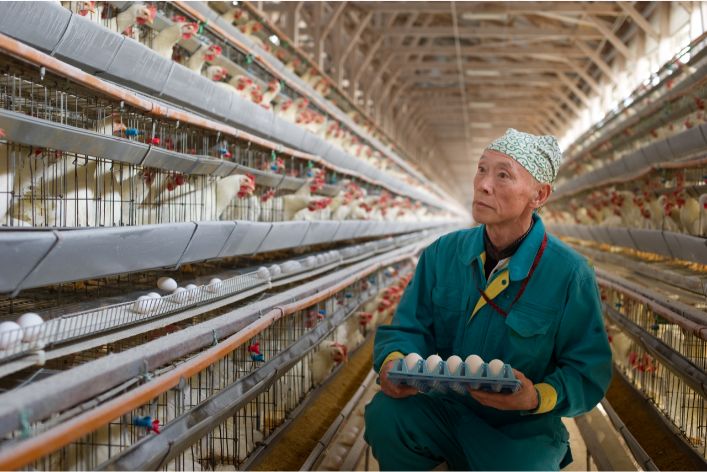Introduction
Are you interested in exploring the top 10 lucrative agriculture professions in Nigeria? Look no further, as this blog post is just for you. Agriculture is vital to Nigeria’s economy, and there is a growing demand for skilled professionals in the sector.
The importance of agriculture in Nigeria cannot be overstated. It provides employment opportunities for millions of people and contributes significantly to the country’s GDP.
Agriculture also plays a crucial role in providing food security and supporting rural development.
The purpose of this blog post is to highlight the top 10 lucrative agriculture professions in Nigeria and provide insight into what each profession entails.
This information is essential for anyone looking to pursue a career in agriculture, whether as a recent graduate or a seasoned professional looking to make a career change.
Read: Midwifery in Nigeria: The Heroes of Maternal Health
Overview of the Nigerian Agriculture Industry
Agriculture remains one of the essential sectors of the Nigerian economy. The sector provides employment opportunities for over 70% of the country’s population and contributes significantly to the country’s Gross Domestic Product (GDP).
Despite this, the industry faces several challenges, including limited access to finance, inadequate infrastructure, and inadequate government support. In this article, we will explore the top 10 lucrative agricultural professions in Nigeria.
Overview of the Agriculture Industry in Nigeria
Nigeria’s agricultural sector mainly consists of small-scale farmers who engage in subsistence farming. However, it has witnessed some growth in recent years, thanks to initiatives aimed at boosting the sector’s productivity.
The industry’s growth has been driven by crop production, livestock, and other agriculture-related activities.
Crop production, which forms the bulk of the sector’s activity, is dominated by rice, yam, cassava, maize, and vegetables, among others.
Livestock production, on the other hand, is also a significant contributor, with poultry, cattle, fish, and goats being the most commonly reared.
The Contribution of Agriculture to Nigeria’s Economy
Agriculture has been a vital sector of the Nigerian economy, providing employment opportunities and contributing to the country’s GDP.
In 2020, the sector’s contribution to the GDP was estimated at 26.95%, according to the National Bureau of Statistics (NBS). This indicates that the sector represents a significant source of revenue for the country.
Furthermore, the sector has contributed immensely to the country’s food security, given its role in the production of food crops and livestock.
It has also contributed to the country’s foreign exchange earnings through the export of cash crops such as cocoa, rubber, and palm oil.
Challenges Facing Nigerian Agriculture
Despite its contributions to the economy, Nigerian agriculture is fraught with several challenges. These challenges have been identified as limiting the sector’s productivity and growth, including:
- Limited access to finance: Small-scale farmers have limited access to finance, making it difficult for them to purchase farm inputs and equipment.
- Inadequate infrastructure: The sector lacks proper storage facilities, transportation, and communication infrastructure, leading to post-harvest losses.
- Climate change: The impact of climate change is increasingly affecting agricultural production, leading to reduced yields and crop failures.
- Inadequate government support: The government’s support for the sector is inadequate, with budgetary allocation and implementation being a significant challenge.
- Rural-urban migration: The trend of rural-urban migration has led to a decline in the number of individuals engaged in agriculture, thereby limiting the sector’s productivity.
Top Lucrative Agriculture Professions in Nigeria
Nigeria’s agricultural sector offers several lucrative opportunities for individuals interested in pursuing careers in the industry. Below are the top ten agricultural professions in Nigeria:
- Agricultural Engineer
- Agricultural Economist
- Agricultural Extension Officer
- Veterinarian
- Fisheries Specialist
- Agricultural Biotechnologist
- Agricultural Science Teacher/Lecturer
- Agricultural Journalist/Communicator
- Farm Manager
- Agricultural Consultant
These professions offer excellent opportunities for individuals interested in contributing to the sector’s growth and development. They also offer competitive salaries and job security, given the sector’s importance to the economy.
The Nigerian agricultural sector is a vital sector of the economy, providing employment opportunities and contributing to the country’s GDP.
However, the industry faces several challenges that limit its productivity, including limited access to finance, inadequate infrastructure, and inadequate government support.
Nonetheless, individuals interested in pursuing careers in the industry can explore the numerous opportunities it offers, including the ten lucrative agricultural professions highlighted in this article.
Read: Optometry in Nigeria: A Vision of Healthy Future
Brief Explanation of What is Meant by “Lucrative Agriculture Professions”
When we talk about “lucrative agriculture professions”, we refer to the various job opportunities that exist within the agricultural industry in Nigeria that offer good financial rewards.
These professions involve the growth, processing, and sale of agricultural produce, and can be found across various levels of the agricultural value chain.
Detailed Explanation of the Top Agriculture Professions in Nigeria
- Agricultural Engineering: Design, develop, and maintain farming equipment, creating solutions for agricultural production and processing. Required skills: proficiency in mathematics, project management, and analytical thinking.
- Agricultural Extension: Disseminate information and knowledge, and promote best practices and innovations in farming. Required skills: strong communication, leadership, and understanding of agricultural practices and technologies.
- Agricultural Economics: Analyze data on agricultural markets to improve industry sustainability and profitability. Required skills: understanding of economics, finance, and statistical analysis.
- Crop Scientist: Develop new plant varieties, and improve existing ones to increase yield and crop quality. Required skills: basic botany and genetics, knowledge of biotechnology, and data analysis.
- Veterinary Medicine: Prevent and treat livestock and animal diseases, and manage animal health. Required skills: strong communication, diagnostic abilities, and knowledge of animal anatomy and physiology.
- Agribusiness Management: Manage and coordinate agricultural operations and services to maximize profits. Required skills: business administration, marketing, strategy development.
- Soil and Water Conservation: Protect and manage soil and water resources to improve sustainability. Required skills: understanding of land management, conservation, and soil science.
- Agricultural Education: Teach agricultural practices and technologies, and promote the importance of agriculture to society. Required skills: strong communication, presentation, and knowledge of agricultural technologies and processes.
- Food Scientist: Develop and improve food products, focusing on nutrition and food safety. Required skills: basic microbiology and chemistry, knowledge of food regulations, and quality control.
- Agricultural Marketing: Promote and distribute agricultural produce, maximize profits through market research and analysis. Required skills: business management, marketing, data analysis.
Skills and Qualifications Required for Each Profession
The specific skills and qualifications required for each profession differ, but commonalities across all professions include a strong work ethic, dedication to learning and improvement, and an ability to work well in a team.
Formal education and training requirements also vary, with many professions requiring a bachelor’s degree or higher.
Prospects for Job Opportunities in Each Profession
The agricultural industry in Nigeria is currently undergoing substantial growth, with increasing demand for food and agricultural products domestically and internationally.
As a result, there are numerous job opportunities across all agricultural professions, with potential for career advancement and growth.
With the right skills and education, individuals in any of these professions can expect to have long and fulfilling careers.
Agricultural Engineer
An agricultural engineer is a professional who applies engineering principles and technology to solve problems related to agriculture and the environment.
They work on a range of tasks, from designing new agricultural equipment to developing water management systems.
Duties and Responsibilities of an Agricultural Engineer
- Conduct research to develop new and innovative agricultural technologies
- Design equipment and structures used in farming, such as irrigation systems, grain bins, and animal housing facilities
- Ensure that agricultural operations comply with environmental regulations
- Collaborate with farmers to identify problems and develop solutions
- Develop strategies to improve crop yield and quality while reducing the use of resources such as water and fertilizer
- Manage projects related to land-use planning and sustainable agricultural practices
Requirements to Become an Agricultural Engineer in Nigeria
To become an agricultural engineer in Nigeria, you will typically need to have a bachelor’s degree in agricultural engineering or a related field. In addition to a degree, employers may also look for candidates with the following:
- Strong problem-solving and critical thinking skills
- Excellent communication and teamwork abilities
- Experience with computer-aided design (CAD) software
- Knowledge of environmental regulations and sustainable agricultural practices
Opportunities Available for Agricultural Engineers in Nigeria
Agricultural engineers in Nigeria can find various employment opportunities in both the public and private sectors. Some of the career paths available to agricultural engineers include:
- Working for agricultural machinery manufacturers, designing and developing new equipment
- Working for federal or state government agencies, developing and implementing policies related to agriculture and the environment
- Working for consulting firms, providing expertise on issues related to agriculture and the environment to clients
- Working for research institutions, conducting studies and experiments to develop new agricultural technologies and practices
In essence, becoming an agricultural engineer in Nigeria can be a rewarding choice for those passionate about using engineering principles to improve agriculture and the environment. With the potential for a range of career paths and opportunities to innovate, agricultural engineering is a profession that aligns well with Nigeria’s growing agricultural sector.
Read: Specialty Nursing Careers: Untold Stories of Nigeria
Agronomist
An agronomist is a professional who specializes in the science of soil management and crop production. They are responsible for maximizing agricultural productivity and sustainability, while also minimizing the impact on the environment.
Here are some of their duties and responsibilities:
- Conducting research to improve crop yields and soil quality
- Developing and implementing new farming techniques
- Advising farmers on how to improve their crops and yields
- Studying and analyzing soil samples
- Determining the best crops for a particular region
If you are interested in becoming an agronomist in Nigeria, there are certain requirements that you must meet:
- Earning a bachelor’s degree in agronomy, soil science, or a related field
- Gaining practical experience through internships or work placements
- Obtaining certification from relevant professional bodies
Once you have become an agronomist, there are many opportunities available in Nigeria. Some of the most popular career paths include:
- Working with government agencies to develop agricultural policies and programs
- Becoming a consultant for farmers and agribusinesses
- Teaching at a university or college
- Working in research and development for private companies
The salary of an agronomist in Nigeria can vary widely depending on their level of education and experience. On average, an entry-level agronomist can expect to earn between NGN 100,000 and NGN 150,000 per month.
However, with experience and expertise, an agronomist can earn well over NGN 500,000 per month.
Overall, the field of agronomy is an excellent choice for anyone interested in agriculture and sustainability. With the right education and experience, you can enjoy a successful and rewarding career in Nigeria.
Agricultural Economist
An agricultural economist is a professional who studies the economic principles and practices in agriculture, including resources, markets, and policies.
They offer insights and recommendations on how to improve production efficiency, manage risks, and market agricultural commodities.
Duties and Responsibilities of an Agricultural Economist
- Conduct research on agricultural policies, markets, and trends
- Analyze data and statistics related to agricultural production, consumption, and trade
- Develop and implement strategies to increase farm productivity and profitability
- Advise farmers, agricultural businesses, and government agencies on economic issues affecting agriculture
- Forecast and monitor impact of weather, changes in consumer demand, and government policies on agricultural production and markets
Requirements to Become an Agricultural Economist in Nigeria
- A Bachelor’s degree in Agricultural Economics, Economics, or related field
- A Master’s degree in Agricultural Economics is highly recommended
- Strong analytical and problem-solving skills
- Good communication and interpersonal skills
- Ability to work effectively in a team and with diverse groups
- Knowledge and experience in using statistical software and economic models
Opportunities Available for Agricultural Economists in Nigeria
- Working for government agencies responsible for agriculture policies and programs
- Consulting for private companies in the agricultural sector
- Teaching and researching in universities and research institutions
- Working for international organizations involved in agriculture and rural development
Essencially, agricultural economists play an important role in ensuring sustainable and profitable agriculture. They help farmers and policymakers make informed decisions that benefit both producers and consumers.
With the increasing demand for food, fuel, and fiber, agricultural economists are in high demand in Nigeria and across the world.
If you are passionate about agriculture and economics, a career in agricultural economics might be the right fit for you!

Veterinarian
A veterinarian is a medical professional trained in providing medical care, diagnosis, and treatment of animals.
They play a vital role in animal health and welfare, and their services are crucial to the agricultural industry.
In Nigeria, veterinarians are highly sought after, and there are many opportunities available for those who pursue a career in this field.
Duties and Responsibilities of a Veterinarian
- Conducting routine check-ups and medical examinations of animals
- Diagnosing and treating diseases and health conditions in animals
- Administering vaccinations and medications
- Performing surgeries and other medical procedures on animals
- Advising animal owners on proper care and nutrition for their pets or livestock
- Monitoring the health of animals in farms, zoos, and other settings
- Investigating and controlling the spread of diseases among animals
- Conducting research and developing new medical treatments for animals
Requirements to Become a Veterinarian in Nigeria
To become a veterinarian in Nigeria, you need to complete a Bachelor of Veterinary Medicine (BVM) degree from a recognized institution.
This degree usually takes five years to complete and includes both classroom instruction and practical training.
After completing the degree, you will need to obtain a license to practice from the Veterinary Council of Nigeria (VCN).
In addition to formal education and licensing, you need to have a love for animals, excellent communication, and interpersonal skills, and be physically fit to be able to handle animals.
Opportunities Available for Veterinarians in Nigeria
Veterinarians are in high demand in Nigeria, and there are many opportunities available for those who pursue a career in this field. Some of the career options available for veterinarians in Nigeria include:
- Private Practice – Many veterinarians in Nigeria run their own clinics and provide medical care to pets, livestock, and other animals.
- Government Jobs – There are many opportunities for veterinarians in government agencies, such as the Federal Ministry of Agriculture and Rural Development.
- Academic Jobs – Veterinarians in Nigeria can work in academic institutions as professors or researchers.
- Animal Production – Veterinarians can also work in animal production facilities, such as farms, hatcheries, and slaughterhouses.
- Wildlife Management – Veterinarians can work in wildlife sanctuaries, zoos, and game reserves, providing medical care to animals and conducting research.
In general, veterinarians play a crucial role in the health and welfare of animals. They are in high demand in Nigeria, and there are many opportunities available for those pursuing a career in this field.
With dedication and passion for animal health, becoming a veterinarian in Nigeria can be a rewarding and lucrative profession.
Fishery Scientist
A fishery scientist is a professional who studies fish and other aquatic organisms to determine the most efficient and sustainable ways to exploit them for commercial purposes while preserving their populations and natural habitats.
The job of a fishery scientist is to understand the biology, behavior, and ecology of fish and aquatic organisms and to use that knowledge to develop new technologies and techniques for improving the management of aquatic resources.
Duties and Responsibilities of a Fishery Scientist
- Conduct scientific research on fish and aquatic organisms to determine their behavior and ecology.
- Develop and implement management plans for commercial fish populations.
- Monitor fish populations and aquatic habitats to evaluate the effectiveness of management plans.
- Design and implement data collection programs to gather information on fish populations and their habitats.
- Collaborate with other scientists, engineers, and policymakers to develop new technologies and policies for improving the management of aquatic resources.
- Conduct economic analyses to determine the potential profitability of different fishing strategies and management plans.
- Develop educational materials and outreach programs to educate the public on the importance of sustainable fishing practices.
Requirements to Become a Fishery Scientist in Nigeria
- Obtain a degree in fisheries science, aquatic biology, marine science, or a related field from an accredited university.
- Gain practical experience working with fish and aquatic organisms through internships or volunteer work.
- Obtain a professional certification from a recognized organization such as the International Council for the Exploration of the Sea or the World Aquaculture Society.
- Acquire skills in key areas such as data analysis, research methods, and project management.
- Possess strong communication skills and the ability to work in a team environment.
Opportunities Available for Fishery Scientists
- Work for government agencies such as the Nigerian Institute for Oceanography and Marine Research or the National Inland Fisheries Training Institute.
- Work for private companies involved in commercial fishing, aquaculture, or seafood processing.
- Work for research institutions such as the Nigerian Institute of Oceanography and Marine Research or the International Center for Living Aquatic Resources Management.
- Work for environmental organizations such as the Nigerian Conservation Foundation or the Nigerian Environmental Society.
- Teach at universities or colleges as a professor or lecturer.
Fisheries science is a growing field in Nigeria with increasing demand for professionals who can help improve the management and sustainability of aquatic resources in the country.
As a fishery scientist, you will have the opportunity to make a significant impact on the environment and the economy while pursuing a fulfilling and lucrative career.
Read: The Path to Becoming a Surgeon in Nigeria
Soil Scientist
Soil scientists are professionals in the agricultural sector who are responsible for studying soil properties, behavior, and composition to improve agricultural production, protect the environment, and enhance sustainable land use.
Their work involves analyzing soil samples, identifying contaminants, and developing strategies to improve soil fertility.
Duties and Responsibilities of a Soil Scientist
- Conducting research on soil properties and behavior
- Analyzing soil samples in the laboratory
- Developing strategies to improve soil fertility
- Advising farmers on proper use and management of land
- Identifying soil contaminants and developing remediation plans
- Conducting environmental impact assessments
- Providing technical advice on agricultural policies and regulations
Requirements to Become a Soil Scientist in Nigeria
- A Bachelor’s degree in Soil Science or related field
- A Master’s or Ph.D. degree in Soil Science for advanced positions
- Membership in professional organizations such as the Soil Science Society of Nigeria (SSSN)
- Professional certification from relevant government agencies
- Strong analytical skills and attention to detail
- Excellent communication and interpersonal skills
- Ability to work independently or in a team
Opportunities Available for Soil Scientists
The demand for soil scientists is on the rise in Nigeria, as the government and private sector are becoming increasingly aware of the importance of sustainable agricultural practices. Opportunities for soil scientists in Nigeria include:
- Employment in research institutions, universities, and government agencies
- Consultancy services for farmers, landowners, and environmental agencies
- Partnerships with agribusinesses and agrochemical companies
- Work in environmental consulting firms
- Opportunities to teach in universities and other educational institutions
Soil scientists play a vital role in the development of sustainable agricultural practices and the protection of the environment.
As the agricultural sector continues to grow in Nigeria, the demand for their services will continue to increase. This makes it a great profession for anyone interested in agriculture and the environment.
Agricultural Extension Officer
As Nigeria continues to strive towards achieving food security, agricultural professions are becoming more lucrative for young graduates. One such profession is that of an Agricultural Extension Officer.
Duties and Responsibilities of an Agricultural Extension Officer
- Provide farmers with practical advice on various agricultural practices
- Organise and conduct training sessions for farmers
- Conduct on-farm demonstrations
- Carry out research on crop development and extension work
- Create and maintain farmer records
- Provide farmers with information on government policies and programmes
The role of the agricultural extension officer is critical in ensuring that farmers are empowered with the knowledge and skills necessary to increase their crop yield and income.
Requirements to Become an Agricultural Extension Officer in Nigeria
- A Bachelor’s degree in Agricultural Extension Services or a related field
- Registration with the Nigerian Institute of Agricultural Extension Services
- Experience in agricultural research and extension work is an added advantage
- Excellent communication skills
- A passion for agriculture
It is worth noting that most agricultural extension officers in Nigeria are employed by government agencies such as the Federal Ministry of Agriculture and Rural Development, State Ministries of Agriculture, and various research institutes.
Opportunities Available for Agricultural Extension Officers
Due to the increasing demand for sustainable agricultural practices and food security, there is a growing need for agricultural extension officers in both the public and private sectors. Here are some of the opportunities available for agricultural extension officers in Nigeria:
- Employment in government agencies
- Employment in research institutes and universities
- Employment in non-governmental organisations (NGOs)
- Consultancy services to farmers and corporate organisations
- Establishing a private agricultural extension service
Agricultural extension officers can also advance their careers through further education and obtaining higher qualifications such as a Master’s degree in Agricultural Extension Services or Agribusiness.
With the right skills and experience, agricultural extension officers can become agriculture policymakers, research scientists or even start their own agriculture businesses.
The role of the agricultural extension officer in Nigeria cannot be underestimated, as they play a vital role in ensuring food security and the sustainable development of the agricultural sector.
Potential agricultural extension officers must be dedicated to agriculture, possess good communication skills and have the necessary qualifications, including registration with the Nigerian Institute of Agricultural Extension Services.
The opportunities available for agricultural extension officers are vast, and with the right skills and experience, they can advance their careers and make a significant impact on Nigeria’s agricultural sector.
Food Scientist
A food scientist is a professional who applies scientific and engineering principles to food production, processing, preservation, and packaging.
They work in various food-related industries, such as food production, manufacturing, research, and development, to ensure that food products meet certain nutrition, safety, and quality standards.
Duties and Responsibilities of a Food Scientist
- Conducting research on food properties, processing methods, and preservation techniques
- Developing new and innovative food products
- Testing food samples to ensure they meet safety and quality standards
- Collaborating with food manufacturers to improve their production processes
- Creating nutritional labeling and information for food products
- Ensuring compliance with government regulations related to food safety
Requirements to Become a Food Scientist in Nigeria
To become a food scientist in Nigeria, you will need the following:
- A Bachelor’s degree in food science, nutrition, microbiology, or a related field
- Strong analytical and problem-solving skills
- Excellent communication and collaboration skills
- A good understanding of food safety regulations
- Experience working in a food-related industry is an advantage
Opportunities Available for Food Scientists
Food scientists in Nigeria can work in various industries, such as:
- Food production companies
- Food processing and manufacturing companies
- Research and development firms
- Government agencies regulating food safety
- Academic and research institutions
The opportunities for food scientists in Nigeria are vast, as the country has a booming food and beverage industry.
With a growing population and increasing demand for safe, high-quality food products, the demand for food scientists is expected to continue to rise.
Furthermore, many food scientists in Nigeria are self-employed and work as consultants, providing their expertise to various food-related businesses and organizations.
This provides them with the flexibility to work on various projects and expand their network of clients.
Food scientists play a crucial role in ensuring that the food we consume is safe, nutritious, and of high quality.
Becoming a food scientist in Nigeria requires a bachelor’s degree in food science or a related field, and strong analytical, communication, and collaboration skills.
The opportunities for food scientists in Nigeria are vast, with numerous job opportunities in various food-related industries and the option to work as a self-employed consultant.
Agric Consultant
An Agric consultant is a professional who provides expert advice and guidance to farmers, agribusinesses, and government agencies on ways to improve agricultural productivity and profitability.
Duties and responsibilities of an agric consultant
- Conducting research on market trends and agricultural practices.
- Advising clients on strategies for crop and livestock management.
- Developing and implementing agricultural projects.
- Assessing soil conditions and making recommendations for improvement.
- Providing guidance on the use of fertilizers, pesticides, and other agricultural chemicals.
- Designing and implementing irrigation systems.
- Providing solutions to problems such as pests and disease control.
Requirements to Become an Agric Consultant in Nigeria
- Bachelor’s degree in Agriculture, Agricultural Engineering, or a related field.
- Experience working in the agricultural industry.
- Knowledge of market trends and agricultural practices.
- Excellent communication and interpersonal skills.
- Computer literacy and ability to use agricultural software.
- Analytical and problem-solving skills.
Opportunities available for Agric Consultants
- Working for government agencies, such as the Ministry of Agriculture.
- Working for agricultural development organizations such as the International Institute of Tropical Agriculture (IITA).
- Working for non-governmental organizations (NGOs) such as the Agricultural and Rural Management Training Institute (ARMTI).
- Working for agricultural companies such as Seed companies, fertilizer companies, and Agro-processing companies.
- Starting a private consultancy business to provide agriculture services to farmers, agribusinesses, and government agencies.
Generally, Agric consultants play a crucial role in ensuring food security, employment opportunities, and economic growth in Nigeria.
The profession has tremendous opportunities for growth and development. Therefore, students who studied Agriculture, Agricultural Engineering, and related courses should take an interest in starting a career as an Agric consultant to transform Nigeria’s agricultural sector.
Conclusion
We have explored the top 10 most lucrative agriculture professions in Nigeria, including fish farming, crop farming, poultry farming, and livestock rearing.
We also saw the importance of agriculture to Nigeria’s economy and job market, as it provides employment for millions of Nigerians and contributes significantly to the country’s Gross Domestic Product (GDP).
Furthermore, we encourage Nigerian youths to pursue a career in agriculture, as there are several opportunities for wealth creation and entrepreneurship in the sector.
With the right skills, knowledge, and resources, one can become successful in agriculture and make a substantial income.
Finally, we urge the Nigerian government and private sector to invest more in the agriculture industry to unlock its full potentials.
Nigeria has immense agricultural potentials that can be harnessed to enhance its economic development and reduce poverty in the country.
With adequate support and investment, the agriculture industry can become a major source of revenue for Nigeria, both locally and internationally.




